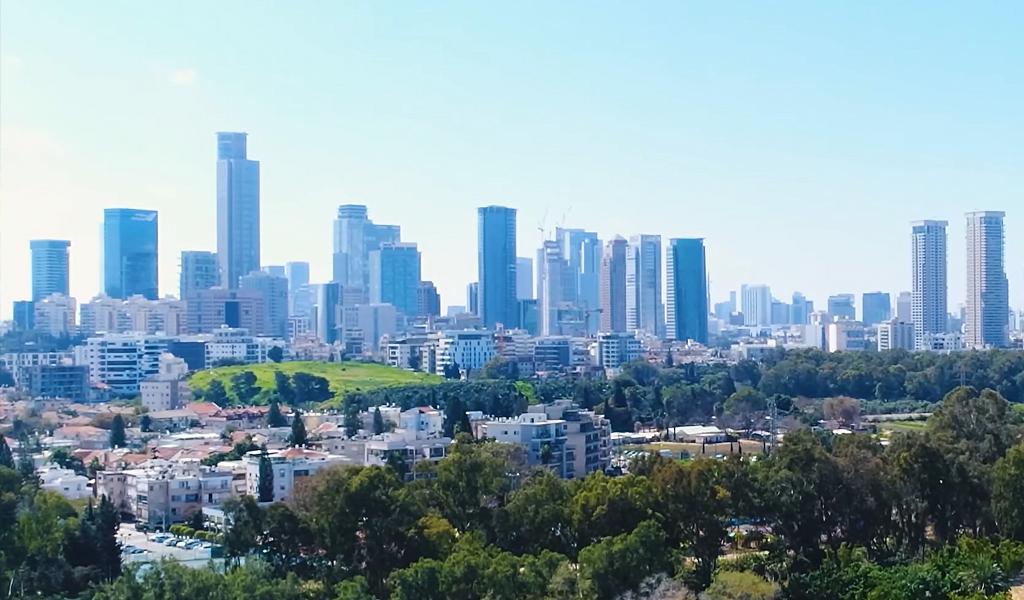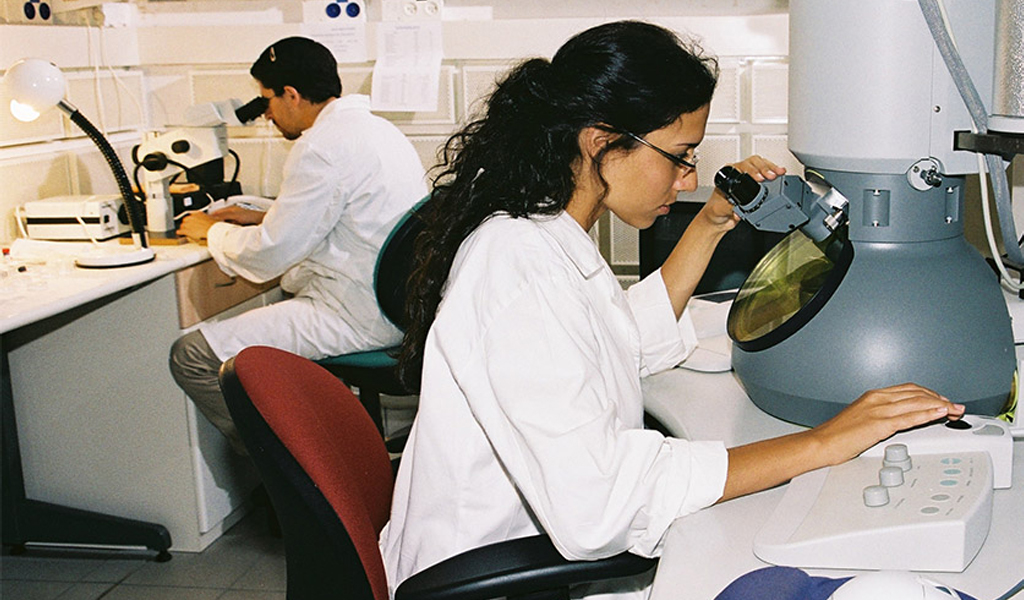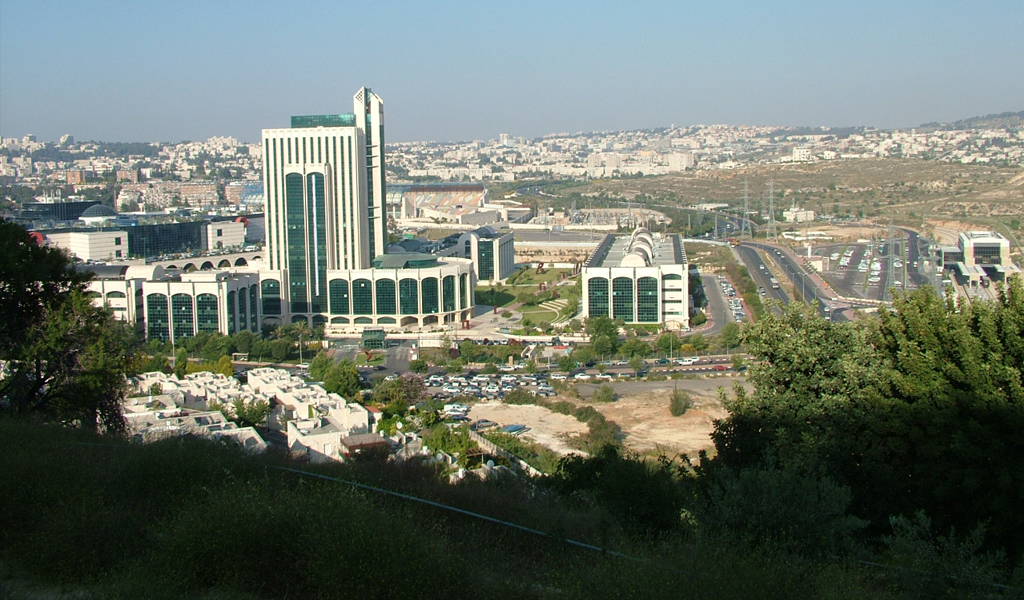Why Israel is a successful startup nation
Assertion
Israel is a major power in the high-tech sector.

The facts
This assertion is correct. Since the mid-1980s, Israel has continuously developed into a major power in the high-tech sector. Israeli technology can be found in every smartphone and in many cars. But the country is also a world leader in the fields of agriculture and the development of new foods, as well as in security and military technology, supplying companies and countries around the world. The Israeli army, the Israel Defense Forces IDF, has played a significant role in this development.
Anyone driving north on the highway from Israel’s largest city, the coastal metropolis of Tel Aviv, with its skyline reminiscent of Singapore or Seattle, will think they are in the USA. Google, Microsoft, Intel, Amazon, Apple shine in large letters from the facades of the modern buildings that line the road towards Haifa. But the buildings are also emblazoned with numerous names that are not familiar here. They belong to Israeli tech companies.
Welcome to the “Silicon Wadi”, the third most important location in the world for high-tech start-ups. Only San Francisco in California and New York are home to larger high-tech centers than the coastal region around Tel Aviv.
The term “Silicon Wadi” is unsurprisingly derived from the world’s best-known high-tech location, Silicon Valley near San Francisco. Wadi means “desert valley” and is therefore the Arabic version of the English “valley”.
But it is not just Silicon Wadi that is teeming with small, medium-sized and large high-tech companies. They can also be found in other parts of the country.

Focus on education – world-class research facilities
Israel’s economic upturn is based on its outstanding universities. The Technion in Haifa is the Israeli equivalent of the Swiss Federal Institute of Technology ETH in Zurich or the EPFL in Lausanne. Tel Aviv University TAU and the Hebrew University in Jerusalem also have a first-class reputation.
With the Weizmann Institute in Rehovot, just outside Tel Aviv, the Jewish state also has one of the world’s leading institutes for basic research. Founded in 1934, the Weizmann Institute has so far produced three Nobel Prize winners. It is also well networked worldwide, for example with ETH Zurich and the Max Planck Institute in Germany.
The high standard of Israeli universities and research institutions is no coincidence. Israel invests 7.1% of total public spending in education (2020), more than most other countries. In 2022, the country invested 6.1% of gross domestic product GDP, i.e. all goods and services produced in the country (2022), in research and development.
This is paying off. According to the “Global Innovation Index 2023”, Israel ranks 14th in the world in terms of innovative strength. A lot of money flows into innovative companies. Between 2013 and 2023, investments in Israeli start-ups increased fivefold to USD 95 billion (the equivalent of around CHF 83 billion). This makes Silicon Wadi one of the six locations worldwide with the most capital for start-ups in the last ten years – and that in a country with just 9 million inhabitants.
From drip irrigation to cell-based meat
Thousands of innovations that have gained a foothold worldwide originated in Israel. Drip irrigation is one example. Thanks to this method, up to 70 percent higher harvests can be achieved with 50 percent less water.
Thanks to this method, the problem of water shortages in Israel, 60 percent of which is desert, is now a thing of the past. The Israeli system is now also used in numerous other regions of the world suffering from drought. It was developed in 1959 by the Tel Aviv-based company Netafim. Thanks to six large seawater desalination plants, which produce 70 percent of the country’s drinking water, the problem of water shortages in Israel is now a thing of the past.
Another example of an innovative Israeli development, this time in the medical field, is a 26 millimeter small camera that is inserted into a pill and swallowed. This enables doctors to better examine the small intestine, which is difficult to access. Given Imaging presented this mini camera to the world in 2001. In 2015, the company and its successor were acquired by the US medtech group Medtronic.
Aleph Farms is another example of Israelis’ innovative spirit and openness to new approaches and technologies. The start-up, in which Migros has also held a stake since 2019, produces cell-based beef. While other countries are still debating whether such lab-grown meat products can be offered to consumers, Israel will be the first country in the world to grant the start-up a license for in-store sales in January 2024.
The best-known Israeli start-ups internationally include the navigation app Waze, which is also used by drivers in Germany, the driver assistance system Mobileye, IronSource for mobile advertising and the network technology from Mellanox Technologies. These companies are either listed on the New York tech exchange Nasdaq or have been acquired by other companies.

Turning away from socialism and immigration from the Soviet Union
In view of the terror of October 7, 2023, Israel’s economy and its start-up sector are more challenged than ever. The army has called up more than 300,000 reservists. They are now missing from the economy and start-ups. The terrible act of terrorism in the south of the country has also unsettled investors. This can be problematic for young companies when it comes to raising capital.
And yet: there is hardly any other state that is as capable as Israel of building a successful economy despite – or perhaps because of – all resistance and thus creating prosperity for its population. Normally, political stability, peace and sufficient natural resources are the decisive factors for building a successful economy.
Israel has none of this. Yet today, the small country is one of the world’s leading economies. The gross domestic product (GDP) per capita amounted to USD 55,000 (equivalent to around CHF 47,000) in 2022. This is more than ten times the per capita GDP generated in neighboring countries such as Egypt, Jordan and Lebanon. GDP per capita there is around USD 4,300.
In 2022, real GDP growth in Israel was 6.5%. Growth of 3.1% is forecast for 2023 and slightly over 3% for 2024. The decline is related to the war in Gaza. In addition to the aforementioned high level of education, particularly in technical fields, there are other reasons for the success story of the Israeli economy in recent decades.
One of these reasons is Israel’s move away from a socialist, state-controlled economy in the mid-1980s towards a market-oriented one. This policy paved the way from an agrarian state to a diversified high-tech industrialized country. The immigration of numerous, well-educated and highly qualified Jews from the Soviet Union after its collapse at the end of the 1980s and beginning of the 1990s also had a positive effect.
The army as an incubator for high-tech experts
Paradoxically, another important element for the economic upswing is the constant military threat from hostile Arab states as well as from Iran and the terrorist organizations it supports.
This constant threat has meant that the Israeli army has invested and continues to invest heavily in training specialists in the IT sector and in the development of new technologies. “We don’t have to invest in the soldiers’ muscles, but in their brains,” said former Israeli Prime Minister and later President Shimon Peres.
This is done by offering the best school leavers of each year the opportunity to serve in special units such as the elite IDF 8200 unit . There they are trained not only in military matters, but also in technical and scientific subjects and in management. Accordingly, the length of service in this high-tech elite unit is longer than the usual three years for men and two years for women. Not only does the army benefit from this system; it also increases the chances of the young men and women trained in this way when they move into the business world after completing their military service and often found their own start-ups.
This in turn is good for the army and has also made Israel a major international power in the field of security and military technology. Rafael and Israel Aerospace Industries are defense equipment manufacturers that have customers worldwide. Switzerland also purchases its latest reconnaissance drones from Israel.
One of the best-known Israeli developments in the military sector is the Iron Dome missile defense system. It is largely responsible for the fact that the constant rocket attacks by the terrorist organizations Hamas and Islamic Jihad from Gaza have caused hardly any damage or loss of life in recent years.
In 2022, Israel invested 4.5% of its gross domestic product (GDP) in its defense force. By comparison, many allies in the NATO defense alliance are struggling to even reach the target of 2%.
Anti-authority and rebellious like the Swiss
There is another element that is crucial to the innovative capacity of the Israeli economy: Israelis are generally skeptical of authority and are not afraid to question – often loudly – what their bosses tell them.
This characteristic is essential when it comes to being innovative. After all, innovations do not usually come from the top, but from the grassroots. But only if the grassroots dare to question what has been imposed on them from above can they make themselves heard and contribute to innovation with creative ideas.
In this respect, as well as in terms of good education, Israelis and Swiss have a lot in common. It is therefore no coincidence that both countries are among the most innovative in the world.
Editor’s recommendation: The State of Israel






